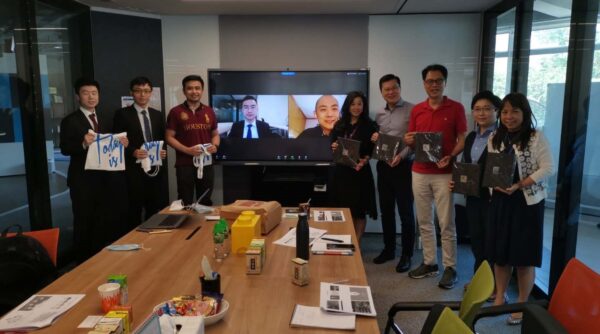A Part-time MBA for ambitious future leaders
- Flexible learning: Part-time students normally meet on CUHK’s main campus at Shatin from 9:30am to 5:45pm every weekend for two classes. Some elective courses may be offered on weekday evenings at either CUHK Business School’s Town Centre in Admiralty or the main campus at Shatin. There are also selected courses to be completed in 3 to 5 days during intensive weeks.
- Diverse curriculum: From business management, fintech, big data, digital marketing to digital transformation, develop your credentials as a future leader.
- Come to where East meets West: A range of exchange programmes, study tours and field trips blend international business learning with essential China business exposure.
- Get to the top of business: Insights and hands-on experience all come with our Entrepreneurship Training, providing intrapreneurial and entrepreneurial mindsets and skills.
Study Roadmap
 |
 |
 |
 |
 |
|
|
|
|
|
Part-time students are required to successfully complete 45 units for graduation.
 |
|---|
|
 |
|
 |
|
 |
|
 |
|
Part-time students are required to successfully complete 45 units for graduation.
 |
 |
 |
 |
|
|
|
|
Part-time students are required to successfully complete 45 units for graduation.
 |
|---|
|
 |
|
 |
|
 |
|
Part-time students are required to successfully complete 45 units for graduation.
Six Optional Concentrations
To tailor your MBA education for career acceleration and building expertise in a specific area, CUHK MBA will offer 6 optional concentrations in 2022-23***.
Students may select either General MBA or up to two concentration options to complete the units of elective courses. Those choosing the concentration option(s) are required to complete 9 units of elective courses for each chosen concentration option(s).
Business Analytics
To help students strengthen data-driven decision making and prepare them for driving innovation, Business Analytics concentration aims to enable students to make extensive use of data for identifying business insights, predicting market changes, and ultimately improving strategic decision making for organisations.
Featured course examples under this concentration:
- Application of AI in Finance
- Database and Big Data Management
- FinTech Analytics
- Management Consulting
- Mergers and Acquisitions
- Platform and Business Strategies
- Digital Marketing
Entrepreneurship and Innovation
In the modern business environment, entrepreneurial mindsets are critical whether students plan to work within an organisation or start their own business. CUHK MBA is the first MBA in Asia offering an Entrepreneurship and Innovation concentration, is determined to help you embrace intrapreneurship, innovation, and agility and design thinking. We strive to train you to be among the continent’s most visionary leaders.
Featured course examples under this concentration:
- Management Decision Making
- Managing Family Business
- Mergers and Acquisitions
- Venture Capital & Private Equity
- Business Negotiation
- Current Fintech Trends
- Managing Innovation & Technology
- New Venture Business Project
- Platform and Business Strategies
- Applied Methods in Technology New Venturing
- Creating Self-efficacy and Impact on Communication
- Funding Technology Commercialization and Applied Entrepreneurship
- Design Thinking for Business Innovation
- Strategic Value of Innovation Technology
Information and Technology Management
In the digital era, advancement in information technology is fundamental to success. Information and Technology Management concentration allows students to learn how to leverage cutting-edge IT skills, data and business analytics to develop effective business strategies.
Featured course examples under this concentration:
- Database and Big Data Management
- Digital Marketing
- Managing Innovation & Technology
- Platform and Business Strategies
- FinTech Analytics
- Application of AI in Finance
Finance
The world is experiencing digital transformation, and nowhere is this clearer than within finance. CUHK MBA offers in-demand technological and financial skills with a focus on analytical and critical thinking, all of which is essential to help you thrive in the competitive workplace and to be an innovative leader in the digital age.
Featured course examples under this concentration:
- Business Valuation and Analysis
- Current Fintech Trends
- Venture Capital & Private Equity
- New Venture Financing in China and Emerging Markets
- Corporate Fund-Raising Initiatives in the Chinese Equity Markets
- Mergers and Acquisitions
- Investment Analysis and Portfolio Management
- Money and Capital Markets
- FinTech Analytics
- Application of AI in Finance
- Sustainable Finance and Impact Investing
- Funding Technology Commercialization and Applied Entrepreneurship
China Business
China’s emergence into the world economy and the development of the Greater Bay Area offers a unique opportunity for prospective business leaders. Students in the China Business concentration can benefit from CUHK’s long-established role as a gateway between China and the rest of the world.
China Business concentration is designed to enable students to discover market opportunities in China by mastering China business knowledge and practical training about doing businesses in China.
Featured course examples under this concentration:
- China in Global Economy
- Corporate Fund-Raising Initiatives in the Chinese Equity Markets
- Managing Family Business
- New Venture Financing in China and Emerging Markets
- Digital Marketing
- Design Thinking for Business Innovation
- Sustainable Finance and Impact Investing
- Creating Self-efficacy and Impact on Communication
Marketing
To win in the age of the empowered consumer, Marketing concentration is primarily geared toward those students with an interest in managerial marketing and big data marketing by learning data-driven and strategic marketing knowledge.
Featured course examples under this concentration:
- Digital Marketing
- Behavioral Decision Making
- Database and Big Data Management
- Business Negotiation
- Creating Self-efficacy and Impact on Communication
- Design Thinking for Business Innovation
** The featured courses offered are subject to change in each term and academic year.
Business Practicum
You will have a chance to participate in one of the projects sponsored by diverse Hong Kong corporations and see how your business ideas, models, and hypotheses play out in the real world to solve a business challenge. A senior staff of the sponsoring company also joins the team as a supervisor to support the successful completion of the project. We offer a wide range of practicum topics like retail, transport, healthcare, hotel and tourism, and property.
This elective course is open for full-time and part-time Year 2 MBA students.

Field Studies
With business field study trips to Greater China, Asia, Europe and the United States, CUHK MBA students leave the school grounds for a short while to see beyond the business setting already familiar to them.
Expect to make new connections between your areas of study by experiencing them first-hand in a culturally different environment, and enhance your understanding through visits and interactions with local enterprises, lectures and seminars, business professionals, government officials and local alumni.
Exchange Programme
With distinguished universities worldwide as exchange partnering schools, students are provided with a truly global perspective and benefit from a significant expansion of their global networks and far greater opportunities to demonstrate their ability to be a global leader.
United States / Canada
- University of Michigan
- University of British Columbia
- The University of Chicago
- The University of Toronto
Europe
- Bocconi University
- HEC Paris
- London Business School
- Warwick Business School
- IE Business School
Asia
- CEIBS
- National University of Singapore, NUS Business School
- Seoul National University
- Peking University
- Waseda University
Full Course List
Course offerings are subject to change. All MBA courses will be taught in English, with the exception of elective courses of a unique nature in which teaching in Chinese is preferable.
The Leadership Development course will create the opportunity for students to reflect on two key areas of leadership; managing themselves (self awareness and understanding) and managing relationships (the impact they have on others). These two aspects involve a high level of self-awareness, the willingness to risk new behavior and the capacity to be flexible and make changes as the environment changes.
This course provides students with a basic understanding of the state of the global economy and macroeconomic policy. Topics include national income accounting, unemployment, inflation, monetary and fiscal policies, and international economic interactions. Applications of economic theories to current macroeconomic phenomena will be emphasised.
The course develops a valuable set of core consulting skills and provides a rich appreciation of modern management consulting of value to both prospective management consultants and to other business students who expect to engage and work with management consultants during their future career. The course complements the Business Practicum elective in which students have the opportunity to apply consulting skills in a real consulting engagement with a local company. In a typical session, the first hour will be an overview lecture on the Topic, or a discussion of the assigned Readings. A short ‘Industry interlude’ will cover aspects of the history and structure of the management consulting industry, including ethics, professional qualifications and recruitment practices. The final ninety minutes will be spent on an assigned “caselet” (a short-form case) based on a real management consulting engagement. Caselets will cover commercial organizations in China and overseas, as well as consulting interventions in not-for-profits and the Public Sector. Students will be placed into groups and each group will be asked to practice specific consulting skills and roles, with opportunities for each student to plan a consulting engagement, facilitate discussions with clients, and lead a consulting team.
Making decision is a fundamental life skill. According to multiple sources, an adult makes about 35,000 decisions every single day. Some decisions are ‘no-brainers.’ Most decisions you’ll face are tough and complex with no easy or obvious solutions. Such decisions affect you, your family, friends, colleagues, work teams, organizations and many other known and unknown. An effective decision-making process may be more complicated than flipping a coin, tossing a dart or letting someone else to make a mediocre choice which depends on luck for success.
To understand the complexity and irrationality that arise in human decision making, you are going to answer many interesting questions in this course. Answers to these questions will shed light on your decision-making process and outcomes. Throughout the course journey of lectures, business cases and interactive exercises, you’ll scratch your heads and learn how to critically make life and work decisions with evidence and effective process.
The objective is to know and understand the significant events and issues that affect the business of running an organization. To discover and understand the human processes that are essential for developing leadership and management skills. The course comprises two parts: a) An experiential programme whereby students will participate in structured outdoor exercises to develop problem-solving, team building, leadership and communication skills. b) A residential course with an integrative approach to understand the complexities of leading and managing a business organization in the new millennium.
Family business is a puzzling topic that fascinates academics, investors, and managers. These businesses are ridiculed, especially in Hong Kong, as unprofessional and cronyism-driven. But one cannot ignore their importance: families started many of the most successful firms in the world; families owned the majority of listed firms; many family firms uphold the best innovation, quality and brand value; and family funds constitute some largest philanthropic and investment projects. This course takes a family enterprising approach to discuss the importance, diversity, complexity, and more importantly continuous entrepreneurship of business family (as opposed to family business). Apart from lectures and case analysis, students should interact with family members and associated professionals to understand the types, life cycle, conflict, succession, characteristics of business families. For sustaining their growth, practical approaches, such as structures and procedures as advisory boards, family councils, family venture funds and spin-offs, and family philanthropy, will also be discussed. This course shall benefit family business members, managers in family-owned firms, and professionals.
It’s an era of “Technology Everywhere”. The rapid advancement in technology literally impacts every sector of our society. From taxi services to mobile payment, from robotic engineering to artificial intelligence; new innovations and technology have laid substantial or even subversive changes to our ways of doing business. It is, therefore, important for senior management to understand the uncertainty and challenges engendered by technological and market changes, and with a better understanding, be able to derive the optimal ways to cope with these changes.
This course is designed to illustrate how to devise a good market plan comprising segmentation, positioning and targeting to achieve consumer satisfaction. Emphasis is placed on adopting the basic marketing concept to enhance a firm’s long-run market position via the creation of a differential advantage while meeting consumer desires at the same time. Another emphasis of this course is to explain how a firm can excel in the ever-changing market and competitive environment.
This course integrates areas within financial management and investments to analyse merger and acquisition (takeover) markets. The class will be conducted using both lectures and presentations. The topics covered in lectures include an overview of takeover markets, legal aspects and restrictions, capital budgeting techniques, the efficient market hypothesis, the market model and computation of abnormal returns, the dividend discount model and the free cash flow model. The topics covered in presentations will include US and Hong Kong cases of mergers, tender offers and leveraged buyouts. Amongst other things, the efficient market hypothesis is applied to analyse the stock market response to takeover announcement as well as a range of other issues including: welfare gains/losses associated with takeover, the cost of capital for due acquiror and the intrinsic value of the target (using dividend discount and free cashflow models).
The course is a practical introduction to short term money markets, long-term capital markets, and derivative markets with an emphasis on Hong Kong in particular and Asia in general. After presenting an overview of these markets within the financial system, the course will focus on specific topics which may include currency, money, bond, stock or derivative market developments, innovations and restructurings, the legal framework, market manipulation and insider trading, regulatory oversight and reform, market technology and related issues.
Application Deadlines for the 2025 Intake
- 31 October 2024 (1st round)
- 15 December 2024 (2nd round)
- 31 January 2025 (3rd round)
- 15 March 2025 (4th round)
- 30 April 2025 (5th round)
*Applications submitted after 30 April 2025 will be processed on a rolling basis until all places have been filled.
Join over 8,000 applicants already!
I Want to Apply Now >>I Want My Free CUHK MBA Brochure >>I Want to Book a Consultation Today >>

